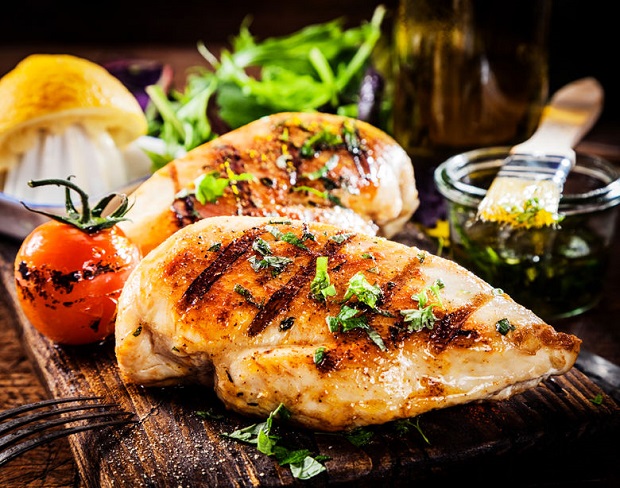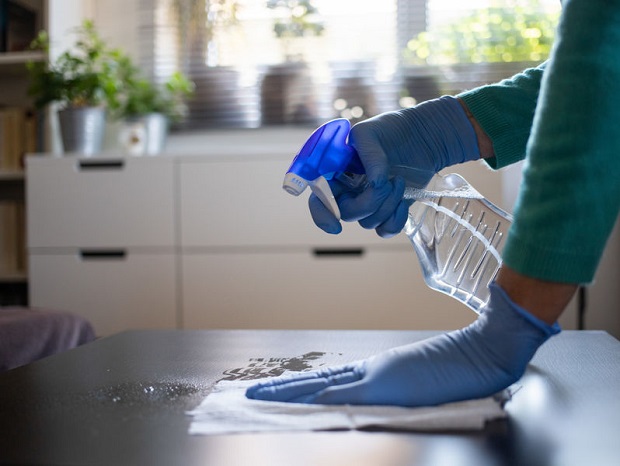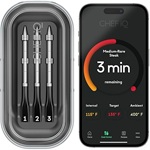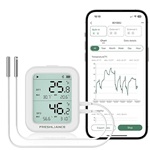
Can You Get Food Poisoning from Chicken?
Answer at a Glance: You can get food poisoning from chicken. The most common form is Salmonella. The USDA’s Food Safety and Inspection Service estimates that there are 1.35 million infections in the US each year. Further, 23% of foodborne Salmonella illnesses are due to eating chicken or turkey. [1]
Dig Deeper
- What Is Salmonella?
- How Do You Contract Salmonellosis from Chicken?
- Additional Causes of Food Poisoning from Chicken
- How to Safeguard Against Food Poisoning from Chicken
- References
What Is Salmonella?
Salmonella is a microscopic bacteria that pass from the feces of animals and humans to other animals or humans. Many animals, especially chickens, cattle, reptiles, amphibians, and rodents, can naturally carry Salmonella in their intestines and show no signs of illness. [2]
How Do You Contract Salmonellosis from Chicken?

When ingested, Salmonella causes a bacterial infection called salmonellosis. According to the Centers for Disease Control (CDC), Salmonella bacteria are a leading cause of foodborne illness in the United States. They are also the leading cause of hospitalizations and deaths linked to foodborne illnesses. [3]
You risk contracting salmonellosis from eating undercooked chicken infected with the bacteria. The CDC reports that more than one in every 25 packages of chicken at the grocery store is contaminated with Salmonella. [4]
The good news is that adequately cooking chicken kills harmful bacteria. The USDA’s Food Safety and Inspection Service (FSIS) recommends using a food thermometer to cook chicken to a minimum internal temperature of 165°F. [5]
Salmonella can also spread on hands and surfaces if not washed properly. For example, if you prepare raw chicken on a cutting board and then use the cutting board to cut up vegetables for a salad, you risk contaminating the salad ingredients with Salmonella.
The FSIS also discourages washing or rinsing raw chicken as cross-contamination can occur. [6] According to Poison Control, in a study of people who washed raw chicken before cooking, 60% had bacteria present in their sink after washing or rinsing the meat, and 14% still had bacteria present after cleaning the sink. [7]
Additional Causes of Food Poisoning from Chicken
Though Salmonella is the most common bacterium associated with chicken, it can be infected by a variety of others, including Staphylococcus aureus, Campylobacter jejuni, Listeria monocytogenes, and Escherichia coli (E. coli). [8]
How to Safeguard Against Food Poisoning from Chicken

- Caution when handling raw meat will help to prevent the spread of Salmonella. Wash hands thoroughly and any surfaces that have come in contact with raw meat.
- Avoid eating raw foods that can harbor Salmonella bacteria, such as undercooked meat, raw eggs, or unpasteurized milk. Also, avoid foods that contain raw eggs, such as Hollandaise sauce or cookie dough.
- Immediately refrigerate chicken after purchase to inhibit the growth of bacteria. Set the refrigerator temperature at 40°F or lower.
- Wrap chicken tightly for storage and separate it from other foods.
- Cook chicken thoroughly to an internal temperature of at least 165°F.
- Discard any cooked chicken that has been sitting above 40°F after two hours.
References
- [1] USDA – Food Safety and Inspection Service – “Reducing Salmonella in Poultry.“
- [2] US Food and Drug Administration – “Get the Facts about Salmonella.“
- [3][4] Centers for Disease Control – “About Salmonella Infection.“
- [5][6][8] USDA – Food Safety and Inspection Service – “Chicken from Farm to Table.“
- [7] Poison Control – “What’s the Safest Way to Cook Chicken?“
DISCLAIMER: THIS WEBSITE DOES NOT PROVIDE MEDICAL ADVICE
The information, including but not limited to text, graphics, images, and other material on this website, is for informational purposes only. No material on this site is intended to be a substitute for professional medical advice, diagnosis, or treatment. Always seek the advice of your physician or other qualified healthcare providers with any questions you may have regarding a medical condition or treatment before undertaking a new healthcare regimen, and never disregard professional medical advice or delay in seeking it because of something you have read on this or any other website.
Related Products
CHEF iQ Sense Smart Wireless Meat Thermometer with 3 Ultra-Thin Probes, Unlimited Range Bluetooth Meat Thermometer, Digital Food Thermometer for Remote Monitoring of BBQ Grill, Oven
Freshliance Temperature Humidity Data Logger Bluetooth Refrigerator Thermometer with 2pcs External Probe, Data Graph Analysis Filtering via APP and Multi-User Sharing, Rechargeable BlueTag TH30R-I

